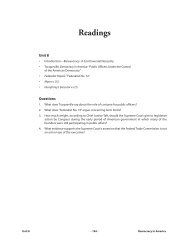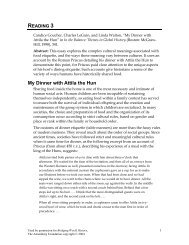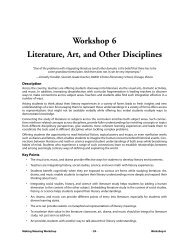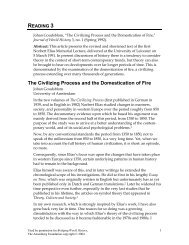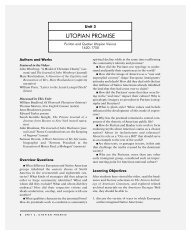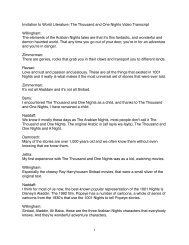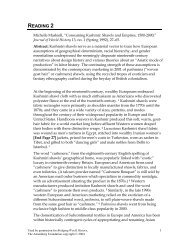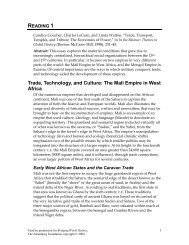Ethics Reader
Ethics Reader
Ethics Reader
Create successful ePaper yourself
Turn your PDF publications into a flip-book with our unique Google optimized e-Paper software.
virtue and the gods: they say that the gods apportion calamity and misery to many good men,<br />
and good and happiness to the wicked. And mendicant prophets go to rich men's doors and<br />
persuade them that they have a power committed to them by the gods of making an<br />
atonement for a man's own or his ancestor's sins by sacrifices or charms, with rejoicings and<br />
feasts; and they promise to harm an enemy, whether just or unjust, at a small cost; with<br />
magic arts and incantations binding heaven, as they say, to execute their will. And the poets<br />
are the authorities to whom they appeal, now smoothing the path of vice with the words of<br />
Hesiod:<br />
Vice may be had in abundance without trouble; the way is smooth and her<br />
dwelling-place is near. But before virtue the gods have set toil,<br />
and a tedious and uphill road: then citing Homer as a witness that the gods may be<br />
influenced by men; for he also says:—<br />
The gods, too, may he turned from their purpose; and men pray to them<br />
and avert their wrath by sacrifices and soothing entreaties, and by<br />
libations and the odour of fat, when they have sinned and transgressed.<br />
And they produce a host of books written by Musaeus and Orpheus, who were children of<br />
the Moon and the Muses—that is what they say—according to which they perform their<br />
ritual, and persuade not only individuals, but whole cities, that expiations and atonements for<br />
sin may be made by sacrifices and amusements which fill a vacant hour, and are equally at<br />
the service of the living and the dead; the latter sort they call mysteries, and they redeem us<br />
from the pains of hell, but if we neglect them no one knows what awaits us.<br />
He proceeded: And now when the young hear all this said about virtue and vice, and the way<br />
in which gods and men regard them, how are their minds likely to be affected, my dear<br />
Socrates,—those of them, I mean, who are quickwitted, and, like bees on the wing, light on<br />
every flower, and from all that they hear are prone to draw conclusions as to what manner of<br />
persons they should be and in what way they should walk if they would make the best of<br />
life? Probably the youth will say to himself in the words of Pindar—<br />
Can I by justice or by crooked ways of deceit ascend a loftier tower which may be a fortress<br />
to me all my days?<br />
For what men say is that, if I am really just and am not also thought just profit there is none,<br />
but the pain and loss on the other hand are unmistakable. But if, though unjust, I acquire the<br />
reputation of justice, a heavenly life is promised to me. Since then, as philosophers prove,<br />
appearance tyrannizes over truth and is lord of happiness, to appearance I must devote<br />
myself. I will describe around me a picture and shadow of virtue to be the vestibule and<br />
exterior of my house; behind I will trail the subtle and crafty fox, as Archilochus, greatest of<br />
sages, recommends. But I hear some one exclaiming that the concealment of wickedness is<br />
often difficult; to which I answer, Nothing great is easy. Nevertheless, the argument<br />
indicates this, if we would be happy, to be the path along which we should proceed. With a<br />
view to concealment we will establish secret brotherhoods and political clubs. And there are<br />
professors of rhetoric who teach the art of persuading courts and assemblies; and so, partly<br />
by persuasion and partly by force, I shall make unlawful gains and not be punished. Still I<br />
hear a voice saying that the gods cannot be deceived, neither can they be compelled. But what<br />
Page 31



